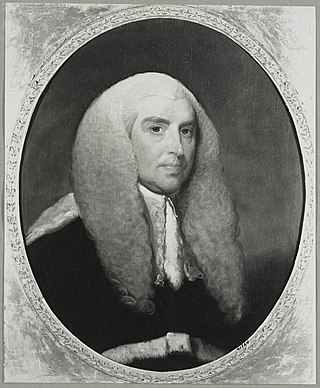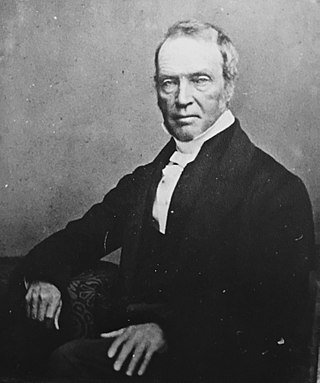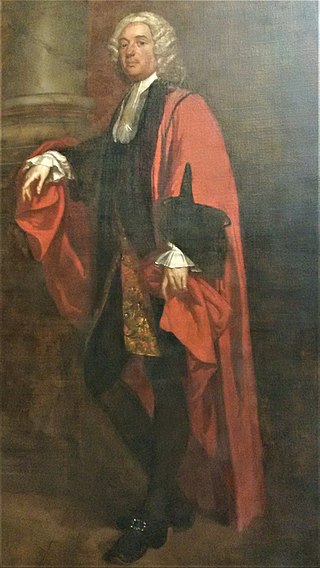Related Research Articles
Barry Yelverton, 1st Viscount Avonmore, PC (Ire) KC, was an Irish judge and politician, who gave his name to Yelverton's Act 1782, which effectively repealed Poynings' Law and thus restored the independence of the Parliament of Ireland. This achievement was destroyed by the Act of Union 1800, which Yelverton supported. By doing so, he gravely harmed his reputation for integrity, which had already been damaged by his leading role in the conviction and execution for treason of the United Irishman William Orr, which is now seen as a major miscarriage of justice.
Joseph Devonsher Jackson PC was an Irish Conservative MP in the United Kingdom Parliament and subsequently a High Court Judge.

Hugh Carleton MRIA, 1st Viscount Carleton, PC (I), SL was an Irish politician and judge.
Sir Riggs Falkiner, 1st Baronet was an Irish baronet and politician.

Philip Tisdall SL was an Irish lawyer and politician, who held the office of Attorney-General for Ireland. He was for many years a leading figure in the Irish Government.

Richard Wilson Greene PC, KC (1791–1861) was an Irish barrister and judge.
Sir Edward Sullivan, 1st Baronet, PC (Ire) was an Irish lawyer, and a Liberal Member of Parliament for Mallow, 1865–1870 in the House of Commons of the United Kingdom of Great Britain and Ireland. He was also Solicitor General for Ireland, 1865–1866, Attorney General for Ireland, 1868, Master of the Rolls in Ireland, 1870. Created a baronet, 29 December 1881, from 1883 to 1885 he was Lord Chancellor of Ireland.
John Tirel, or Tyrell was a prominent judge and statesman in fourteenth-century Ireland who held office as Serjeant-at-law and Chief Justice of the Irish Common Pleas.
Sir John Meade, 1st Baronet (1642–1707) was an Irish barrister, judge and politician. He was the first of the Meade Baronets of Balintubber, and an ancestor of the Earls of Clanwilliam. He was unusual among the lawyers of his time for his lack of ambition to become a judge of the High Court, despite being generally regarded as a barrister of "excellent parts (qualities)". In matters of religion, he seems to have been, by the standards of his time, a man of very tolerant views: although he was himself a Protestant, he damaged his career by marrying Elizabeth Butler, who was a Roman Catholic, as his third wife.
The Honorable James Browne was an Irish Member of Parliament and Law Officer. He sat in the House of Commons of Ireland from 1768 to 1790.

Sir James Chatterton, 1st Baronet, was an Irish lawyer and politician, and the first of the Chatterton Baronets of Castle Mahon.

Eaton Stannard (1685–1755) was a leading politician and lawyer in 18th-century Ireland. He was a popular Recorder of Dublin, a very unpopular serjeant-at-law (Ireland), and an experienced parliamentarian who represented Midleton in the Irish House of Commons for many years. He is mainly remembered now as a close friend of Jonathan Swift, whose last known letter was written to him.

Henry Purdon was an Irish barrister, politician and Law Officer of the early eighteenth century. He sat in the Irish House of Commons and held the Crown office of Third Serjeant.
Maurice Coppinger was an Irish barrister and politician, who sat in the Irish House of Commons for many years, and held the office of King's Serjeant. His name is commemorated in Coppinger Row, a side street in central Dublin city; his townhouse was on South William Street nearby.

Nicholas Kerdiffe was an Irish barrister and Law Officer of the early seventeenth century.
Richard Benson Warren (1784-1848) was an Irish barrister and Law Officer who held the position of Serjeant-at-law (Ireland).

George Hamilton (1732–1793) was an Irish politician, barrister and judge. He sat in the Irish House of Commons as MP for Belfast, and held office as Third Serjeant-at-law and later as a Baron of the Court of Exchequer (Ireland). Today he is chiefly remembered for developing the town of Balbriggan, County Dublin.
Sir John Bourke Howley (1789-1866) was an Irish barrister and Law Officer who held office as Serjeant-at-law (Ireland) for many years. Despite his obvious desire to be promoted to the Bench, he never became a judge.

Hewitt Poole Jellett was an Irish barrister and judge. He is notable for holding the office of Serjeant-at-law (Ireland) for more than twenty years until his death at the age of eighty-six.
Walter FitzWilliam Cotterell was an Irish barrister and Crown official of the late fourteenth century. He was Serjeant-at-law (Ireland) and acted from time to time as a judge of gaol delivery and of assize, although he was never a justice in the Royal Courts. The evidence suggests that he was a conscientious and hard-working official who enjoyed the complete trust of the English Crown.
References
- Bennett, George, The History of Bandon Henry and Coghlan 1862
- Burke's Peerage 107th Edition Delaware 2003
- Hart, A.R. History of the King's Serjeants at law in Ireland Dublin Four Courts Press 2000
- Smyth, Joseph Constantine "Chronicle of the Law Officers of Ireland" Henry Butterworths London 1839
- White, James Grove Historical and topographical notes on Buttevant, Castletownroche, Doneraile, Mallow and places in their vicinity, Guy and Co. Cork 1905